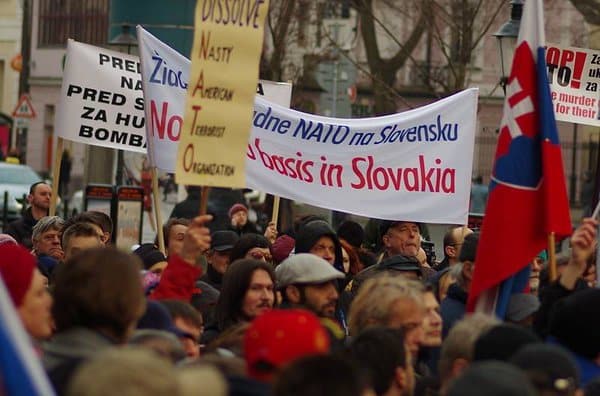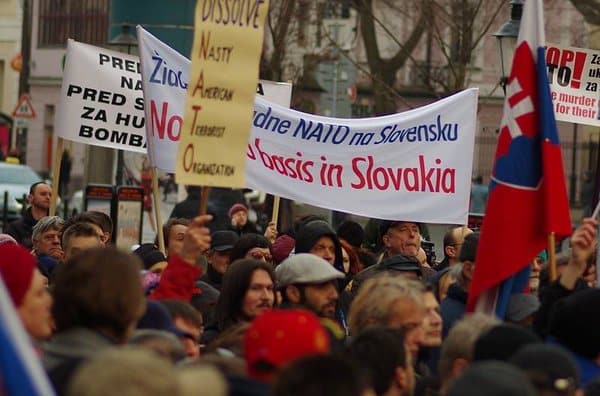Montenegro is to be officially admitted into the North Atlantic Treaty Organization on June 5. The Montenegrin parliament has approved becoming NATO 29th member country amid a certain degree of popular rejection shared by most of the political opposition, who demanded a public referendum in order to ratify its membership of the military alliance.
The organization has grown from twelve founding members in 1949 to 28 today. The most recent new members, Albania and Croatia, joined in 2009.
There are three officially recognized aspiring members: Bosnia and Herzegovina, Georgia, and Macedonia. Extending membership is currently a topic of debate, including Sweden, Finland. Ukraine and is less likely to join but the membership is not excluded, it’s on the agenda.
The alliance appears to be constantly expanding with new aspiring nations knocking at the door. This fact is often adduced to demonstrate success. With Montenegro to join soon, the bloc’s expansion grabs media headlines. At the same time, little is said about the emerging trend in the opposite direction.
Over 150,000 people have already signed the petition to kick off a referendum on Slovakia’s withdrawal from NATO. The initiative has been launched by the opposition anti-NATO, anti-EU Kotleba – People’s Party Our Slovakia. The petition needs 350 thousand signatures to start the process.
The country joined the bloc in 2004. No referendum was held. The recent surveys have shown negative attitude to the idea of membership. According to a Globsec agency’s poll conducted in 2016, 47 percent of Slovaks answered that neutrality would be better than membership in the alliance. “As many as 59 percent of Slovaks see the role of the USA in Europe and in the world in a negative light.” the SITA newswire quoted the poll. “And 60 percent of them believe the idea that the USA uses NATO to control small countries.” The survey found that there was considerable opposition towards the NATO infrastructure. In total, 56 percent of Czechs, 55 percent of Slovaks and 34 percent of Hungarians are against building allied bases on their territories.
Last year, anti-NATO protests inflamed Bratislava. On May 18, 2017 protesters hit the streets in opposition to the plans on stationing NATO facilities on Slovak soil. Support for the alliance membership is apparently dwindling. Slovakia can become the first member to leave it by 2020.
It’s not Slovakia only. Still a member, Turkey is definitely shifting away from the alliance to implement independent foreign policy. The possibility of its exit from the bloc is widely debated. The German aircraft and military personnel are preparing to leave Turkish İncirlik air base as the relations between Berlin and Ankara have greatly deteriorated. It takes place against the background of cracks emerging to undermine the unity of the alliance.
With Brexit gaining momentum, Scotland is pushing for an independence referendum. If the vote is in favor of leaving, it will automatically lose NATO membership. There are voices raised in Greece calling to withdraw from the alliance.
The organization is deeply divided on many issues. During so many years it has failed to bridge the gap between Greece and Turkey – the two members balancing on the brink of conflict. The bloc is far from being unanimous on Russia.
The idea of an independent European deterrent is a top issue on the agenda. Last July, the EU strategy document titled European Union Global Strategy stated that the bloc should look to create greater military autonomy from NATO. The plans foresee the development of new European military and operational structures, including joint headquarters. Sweden and Finland, EU members outside NATO, might prefer an EU alliance to the North Atlantic bloc. If the concept comes to fruition, the raison d’etre for NATO will be put into question.
Concerns have been expressed by NATO officials over creating rivalry and challenging the North Atlantic Alliance’s primacy as the main defence structure. A European independent capability to carry out its own military operations will greatly weaken NATO and put an end to the Old Continent’s dependence on the United States.
The alliance has demonstrated its ineffectiveness. It is not involved in the most important conflict regarding the future of Europe – the war in Syria, and demonstrates that it is not ready to respond to new threats and challenges, such as the fight against terrorism. No NATO operation is conducted there. Some members take very limited part in the conflict as members of the US-led coalition of the willing. Europe is facing multiple threats in its strategic neighborhood coming from the Sahel to the Horn of Africa, through the Middle East, the Caucasus and up to the new frontlines in Eastern Europe. The US has other threats to fend off. North Korea is a real threat to the US but not to Europe. Their interests do not match.
All in all, the exalted NATO unity is more of a myth than a real thing. There are deep divisions and unsettled problems undermining the organization. No doubt, all these issues will be kept out of spotlight during the May 25 NATO summit. But the highfalutin speeches to be delivered do not change the fact that the bloc is in the lurch and the events in Slovakia confirm the trend.
Reprinted with permission from Strategic Culture Foundation.



